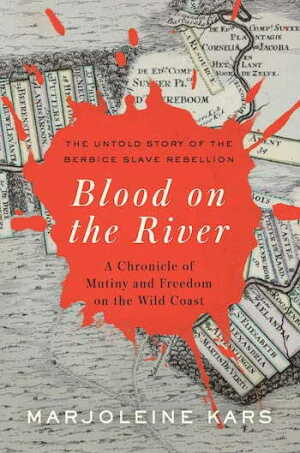Blood on the River
A Chronicle of Mutiny and Freedom on the Wild Coast
Marjoleine Kars
Winner of the 2021 Cundill History Prize
Winner of the Frederick Douglass Book Prize
On Sunday, February 27, 1763, slaves in the Dutch colony of Berbice on the Caribbean coast of South America launched a massive rebellion. No Atlantic slave uprising ever succeeded, except for the 1791 revolt in St. Domingue, but the Berbice rebellion came amazingly close. The insurgents killed several dozen Europeans and sent the rest fleeing, and they kept them at bay for months. In the end, the rebels ran out of food, weapons, and ammunition, and the Dutch regained their colony. They tried the participants, leaving behind an unprecedented account of an extraordinary event and providing a detailed view of the rebellion and counter-insurgency. That view challenges prevailing views of slave rebellion, European mastery, and Atlantic revolutions, including our own.
Blood on the River: A Chronicle of Mutiny and Freedom on the Wild Coast charts what a slave rebellion and its suppression looked like in a tropical colony. Surrounded by jungle and savannah, the revolutionaries, Amerindians, and Europeans parried and counter-parried against a backdrop of the larger Atlantic world. Initially, the slave rebels held the advantage against the Dutch governor. Then, as both sides struggled with shortages of food and weapons, internal divisions and political discontent followed. In the end, the Dutch prevailed because of one unique advantage—their long Atlantic reach. Unlike the rebels, the Dutch could get soldiers and supplies from neighboring colonies and from Europe.
By paying attention to the internal politics of rebellion, Blood on the River tells a story of all the participants, including women and those who chose not to participate, and in so doing complicates the story of rebellion. The Berbice Rebellion, so much lengthier and better documented than most, exposes the tensions, fissures, and inequalities that were present in slave communities, and shows how these characteristics shape insurgency.
Published by The New Press
Praise for Blood on the River
This is required reading for historians of the Black Atlantic world.
— Jennifer Morgan, professor of history, NYU, and author of Reckoning with Slavery
A richly detailed account of a gripping human story
— H. W. Brands, The Washington Post
[An] epic history. . . . A sweeping, thoughtful narrative, joining a new wave of books that make visible previously dismissed Black voices.
— Carolyn Kellogg, Los Angeles Times
A powerful book that will appeal to experts and—thanks to the lively and accessible writing style—the general public alike.
— Black Perspectives
A gripping tale about the human need for freedom. . . . The story of the Berbice Rebellion begs to be told, and Kars’ telling is impressive.
— Martha Anne Toll, NPR Books
A riveting addition to the history of the search for freedom in the Americas.
— Kirkus
This striking study unearths a meaningful chapter in the history of slavery.
— Publishers Weekly
A must-read for anyone interested in slave revolts and the history of Atlantic slavery.
— Library Journal
